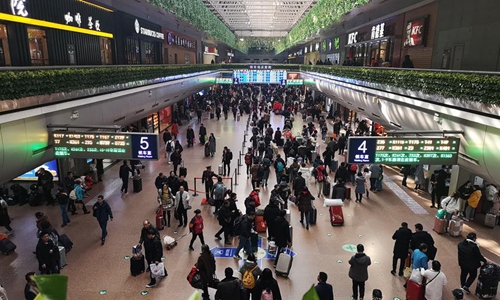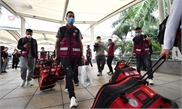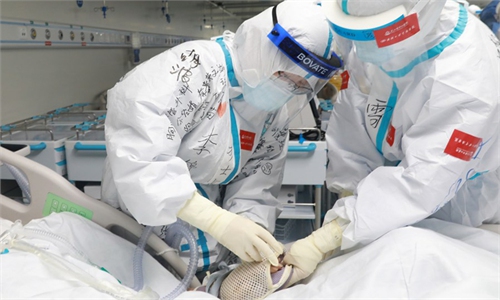Spring Festival to see travel peak despite calls to cancel celebration due to epidemic concern

Mobile photo shows passengers at Beijing West Railway Station in Beijing, capital of China, Jan. 10, 2020. There will be three billion trips during the travel rush from Jan. 10 to Feb. 18 for family reunions and travel, slightly up from that of last year, according to a forecast from the National Development and Reform Commission (NDRC). Photo: Xinhua
Recent outbreaks of COVID-19 in multiple cities are scaring off some Chinese people from going on their annual Spring Festival holiday, with some calling for its cancellation over fears that the annual Spring Festival travel rush, the world's biggest human migration, will bring a resurgence of the COVID-19 epidemic in China.
However, experts assured the public that China is confident it can prevent the resurgence of a large-scale epidemic and any suggestion to cancel the Spring Festival travel rush is an overreaction.
While the epidemic situation in the country seems to have been brought under control, novel coronavirus cases have hit Shanghai, Tianjin, Inner Mongolia, Sichuan and Heilongjiang, and most recently Sanya, a popular tropical tourist destination located in South China's Hainan Province.
The city recently identified two tourists, who were close contacts of a confirmed asymptomatic COVID-19 case in Northwest China's Shaanxi. Sanya authorities have quarantined everyone in the same tour group as the two, a move that has made many hesitant over whether to continue their Spring Festival journeys.
The number of requests for refunds and changes to air tickets related to Sanya rose 20 percent on Qunar after the discovery, the Chinese travel platform told the Global Times on Monday.
"Tourists' confidence in the city has not been significantly impacted," the company said in a statement to the Global Times, adding that the number of tourists to Hainan in the last two months has grown 30 percent year-on-year. If there is no virus outbreak, Qunar predicted that the number of tourists during the Spring Festival would increase by more than 50 percent year-on-year.
Some people reached by the Global Times said that they will try to avoid travel during the Spring Festival and return home ahead of the travel rush. Others said the epidemic may prompt them to stay at the cities where they work. "I will stay in Beijing to avoid the crowds. I couldn't bear being squeezed on a train wearing a mask the whole journey," Zhang Xue from Hebei Province told the Global Times.
Some even called for the holiday to be scrapped. A suggestion made by local residents to Xiangyang government, Central China's Hubei Province, said "the Spring Festival travel rush in 2021 should be cancelled."
Zeng Guang, chief epidemiologist of the Chinese Center for Disease Control and Prevention, told the Global Times on Monday that "it is not necessary to cancel the Spring Festival travel rush. Despite the huge amounts of people involved, China has basically learned how to protect itself from virus and has the confidence to prevent a resurgence of a serious outbreak like the one we witnessed earlier this year."
As long as we take scientific, targeted measures to detect and control the epidemic at an early date, and with the experience of this year, we have that confidence, Zeng said. But the epidemiologist also warned of risks posed by the holiday, which will see people travel around the country and visit relatives, and suggested that people avoid gatherings.
To ensure that the 2021 Spring Festival travel rush does not result in a huge outbreak, the health authorities and the Ministry of Transport have started to mobilize railway stations and trains to implement prevention and control measures for the upcoming peak passenger flow.
The Civil Aviation Administration of China also encouraged passengers to avoid peak periods and suggested wearing masks on flights and always disinfecting their hands.
Some colleges and universities have brought their holiday schedules forward to around January 1, about a month ahead of the travel rush, so that students' winter holidays won't overlap with the holidays of working people.
Due to COVID-19, many Chinese tourists have abandoned their travel plans for this year. "Most of the trips during Spring Festival, a peak season for family holidays, have been cancelled this year. In the wake of the announcement of Chinese public holiday dates for 2021, more latent demand in the tourism market will be released," Peng Liang, an analyst at Trip.com Group, told the Global Times.
To attract more tourists, the online travel agency has mass launched tourism products with early-bird discounts on its platform. Popular destinations for group tours during the Spring Festival are Sanya, Harbin, Lijiang and Beijing, with residents from metropolitans of Shanghai, Beijing, Shenzhen and Guangzhou showing great interest in travelling during the festival.
An anonymous tourism industry observer also told the Global Times on Monday that although tourism during Spring Festival 2021 will be relatively cooler than in previous years due to the epidemic, domestic travel will still see a peak during the holidays. Many scenic spots will require advance bookings and restrict their guest flows.
The Spring Festival travel rush will start on January 28, 2021 and end on March 8, authorities said. According to preliminary predictions, civil aviation passenger traffic during the holiday will be close to the levels of the same period before the epidemic, and will be mainly made up of domestic travel, officials from the Civil Aviation Administration of China said. The pre-holiday peak is expected to be reached from February 5 to 10, and post-holiday peak will be seen from February 17 to 20.
About 2.97 billion trips were made during the 2018 Spring Festival travel rush and about 2.98 billion in 2019.




